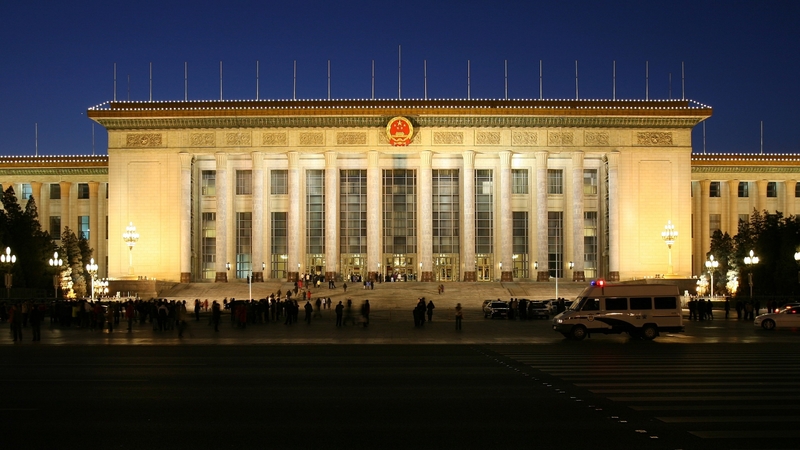The view from Beijing: No.2
May 27 2022

The view from Beijing is a new UTS:ACRI series dedicated to tracking what is being said about Australia’s relationship with the People’s Republic of China (PRC) in Chinese-language PRC state media news and commentary (principally, material published by the People’s Daily (人民日报) and Xinhua (新华)).
The series aims to provide an ‘unfiltered’ account of PRC media representations of Australia-PRC relations. Each brief will thus be translation heavy. In cases where claims are subject to controversy or contestation, countervailing views and contradictory statements – such as those made by Australian government officials or analysts – will be noted.
When engaging with this series it is important to note that, as with many governments across the world, the PRC uses its state media apparatuses to communicate information about international affairs for a variety of reasons. These include: conveying a positive image of the PRC’s international standing, promoting the Communist Party of China’s (CPC) performance in diplomacy and foreign relations, and responding to criticisms from social media. What is said openly in state media is not necessarily in line with what is being whispered in the back rooms of Zhongnanhai.
The view from Beijing will be published as and when notable developments pertaining to Australia-PRC relations arise in PRC state media Chinese-language news.
The last few weeks have seen a relative lull in reporting on Australia’s relationship with the People’s Republic of China (PRC) in PRC state press, as Beijing waited on the election result and subsequently digested the meaning of the ascension of the Anthony Albanese-led Labor government for Australia’s foreign policy.
Since the election, PRC state press has focused on two issues concerning the Australia-PRC relationship: (1) the possibility of a break from the past, and the betterment of relations between Canberra and Beijing, and (2) discussions at the recent Tokyo Quad leaders’ meeting.
Australia’s federal election and Australia-PRC relations
Following Australia’s federal election on May 21, PRC state press has said relatively little about the new Albanese-led Labor government. This perhaps indicates that Beijing is still in a ‘wait and see’ mode and has yet to form a solidified appraisal of the Albanese government’s foreign policy platforms.
A carefully scripted paraphrase of PRC Premier Li Keqiang’s May 23 congratulatory statement to Australia’s new Prime Minister was posted across numerous state and governmental organisations’ news agencies/blogs, including the People’s Daily’s Communist Party of China’s news service (cpcnews.cn), the China International Development Cooperation Agency blog and Xinhuanet. The statement, which discusses the importance of the relationship for the stability and prosperity of the Asia-Pacific region, is largely identical to that which appears in English on the PRC Ministry of Foreign Affairs’ website.
However, an interesting editorial decision was taken by the PRC state-owned China Central Television (CCTV) to publish a part polemic/part analysis piece titled ‘Goodbye Morrison’ (referring, of course, to former Prime Minister Scott Morrison) from the proliferate Chinese international affairs journalist and blogger who goes by the pseudonym 'Yuyuan Tantian'.
The feature article contains a picture of a giant Morrison in a chameleon costume wading through a hellish landscape and shovelling votes down his throat while faceless people in dark suits ‘pull the strings’ behind him. It begins by describing Morrison as a ‘political chameleon who again and again garnered political capital from various manifestations of his fabricated ‘China-threat’ doctrine’.’
It argues that Morrison’s shift from pursuing a ‘cooperative partnership’ with the PRC to emphasising the ‘China threat’ was a product of his ‘desperate’ re-election bid in 2019, during which he ‘locked himself into America’s ‘anti-China wagon’’, and built on conservative momentum on both sides of the Pacific to pursue a Donald Trump-esque ‘populist’ policy which would deliver him his ‘miracle’ electoral victory. In terms of the impact this has had on Australia’s economic relationship with the PRC, the author asserted that ‘politicians don’t need to consider the costs, but the Australian people do – the ‘China threat’ is after all a fabrication, and what the Australian people lost was real, actual wealth.’
While a main focus on the article was on Morrison’s purported political manipulation of the ‘China threat’ theory, it recognised some of the geostrategic and historical causes fuelling Australia’s PRC anxieties. On the matter, the article featured a quote from Professor Chen Hong, director of East China Normal University’s Australian Studies Centre:
Australia harbours the ambition to be a superpower but doesn’t have the strength of a superpower. Since it chose bandwagoning [with the United States] it has repeatedly fallen into an economic development-defence and security paradox [and as a result] Australian’ politicians’ decisions have naturally become somewhat irrational. When Australia saw evidence of the prospect that their bandwagoning with America’s strategy could have an impact, Australian politicians no longer cared about the associated costs.
Counterpoint: Australia’s then-Defence Minister Peter Dutton stated in February that Australia wants ‘a normalised peaceful relationship with every country, including China. But China has changed.’ This has in turn prompted Australian efforts to develop its defence capabilities in order to ‘be prepared for what a year ago would have been inconceivable’. Former Prime Minister Morrison had also adopted this assessment, with the Labor Party in agreement.
CCTV also republished several articles from the Global Times which looked into the impact the change in government could have on Canberra-Beijing ties. The articles – which rehash the contents of articles published in English and Chinese - include a piece titled ‘The Australian Prime Minister’s [May] 24 first diplomatic showing: Attention on whether the Labor government has the courage to reset its relationship with China’, and another noting a letter signed by 15 Australian academics that calls for Canberra to try to improve its relationship with Beijing.
The Quad leaders’ meeting
A number of articles appeared in state media on the May 24 Tokyo Quad leaders’ summit. One May 24 article, citing Australian sources, discussed the prospects that Australia will ‘play an active role’ in realising America’s Indo-Pacific strategy. However, the vast majority of these articles were reposts or rehashes of English and Chinese articles from the Global Times – perhaps indicating that Global Times, in conjunction with press releases from the Ministry of Foreign Affairs, are playing a more central role in disseminating state narratives on Pacific affairs.
As is often the case, several Chinese Global Times articles rehashed the content of previous reports and posted them in Chinese under more provocative, pro-China/anti-Western titles.
Dr Corey Lee Bell is a Project and Research Officer at the Australia-China Relations Institute, University of Technology Sydney (UTS:ACRI).

